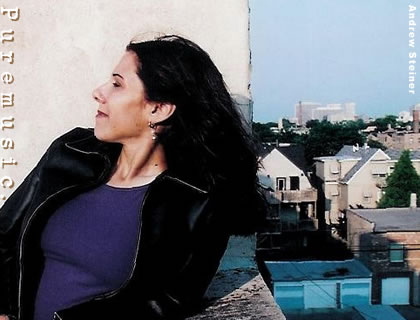
A Conversation
with Joy Eden Harrison (continued)
PM: You've had a couple of great songs end up in major movies. How did that happen? Did they get pitched, or just heard and picked up?
JEH: I guess two ways. That was off my first album, Angel Town.
PM: Which I just bought on Ebay this morning.
JEH: Oh, wonderful. That was, let's see, another great story. Buddy Blue is also a great producer. But one of them, the record label I was on, Bizarre/Planet, which was Frank Zappa's label originally--
PM: And Beefheart, of whom I'm a huge fan.
JEH: [laughs] Great. Yeah, the label got it on Suicide Kings. I'm not sure how. I was just informed by the label that I had a song coming out in a movie. And then the other one, a friend of mine is a film producer, and she really liked the CD and played it for the director, and he decided to use two cuts in the film he was doing.
PM: What is that other song? I forget.
JEH: "The Love Beneath Your Lies." That went into Curtain Call.
PM: Curtain Call, right.
JEH: And then "Marlene" went into Suicide Kings.
PM: Wow. Very cool. Did either of those make you any dough?
JEH: Yes. That is the beauty, that the money in music is in the publishing.
PM: Yeah, absolutely.
JEH: It was the gift that kept on giving. BMI would send me checks quarterly, sometimes large, sometimes small, but it depended on if it was coming out on what channel--
PM: Yeah.
JEH: And when they got released in Europe, that was another nice little infusion.
PM: So yeah, thanks for indulging my interest in your fascinating story. But before we go into the very latest work, tell us, please, about getting married, and your day gig, and all that.
JEH: Well, my husband I met through starting my own label. I had a friend on the Beastie Boys' label who would come out from L.A. to sort of help me get started and organized. And she was always talking about this person that had an indie label distribution company that she would visit when she was in Chicago helping me. She worked with him for other things. And he and I first met business-wise. I just wanted to introduce him to the album, and to see the kind of setup that he had, which was a big warehouse with a lot of different small labels inside it. So we had a meeting for business reasons, and then the rest is history. We just started talking and never stopped.
[We talked here off the record for a bit about her husband, and the cruel money trench called the music business, and it led to Joy's day gig, teaching school.]
JEH: I think people who are in it for money see artists as part of the slot machine, you know? You play it to win. You don't play it because you love it.
PM: Right.
JEH: So that's where teaching came in.
PM: Ah.
JEH: I thought, well, I'll take the time off to do art, which I can do now for the rest of my life in a balanced financial situation, which is the summers off. And it will also add some real anchoring to my life and grounding, some living and interacting in the real world, not spending time on tour, or booking shows, or all this other stuff. It'll ground me in the real world.
PM: There's something about the artistic life without some aspect of that that is so kind of megalomaniacal, so "all about me," that it really makes people delusional, I think.
JEH: Ah. You couldn't have said it better. Exactly that.
PM: And so how is being a teacher working out for you? And who is it that you're teaching, and what are you teaching to them?
JEH: Well, I teach fourth grade on the South Side of Chicago, so it's a little bit of a challenging environment, high poverty and crime, and gangs. But the children--
PM: Jeez!
JEH: --the children that I'm teaching are remarkable. And I tell you, teaching just--I guess you could say it keeps me fresh, because they're so awake, they're so present, they're so filled with wonder. And I have to be there for them.
PM: Hmm.
JEH: I have to feed them, and help create riverbanks to funnel their creativity.
PM: Wow.
JEH: My father asked me--and he's an artist--he asked me if I was going to use teaching as fuel for my work. And I said, "No. I think that for me, I want to give my students the tools to write the story of their own lives. So my concern is to instill in my students a love of words and an understanding of the power of words to change their minds, change their lives, change the world, or just to reflect their minds, reflect their hearts." And so our big project last year at the end of the year was for them all to publish a book, and then have a reading. And yeah, I love teaching, it really does keep me present.
PM: Although, looking back, I can remember a good teacher or two, it's hard to imagine what it would be like having a fourth grade teacher like you.
JEH: I feel equally lucky to have the students that I have. They're really extraordinary, and being with them gives me a lot. continue
print (pdf) listen to clips puremusic home